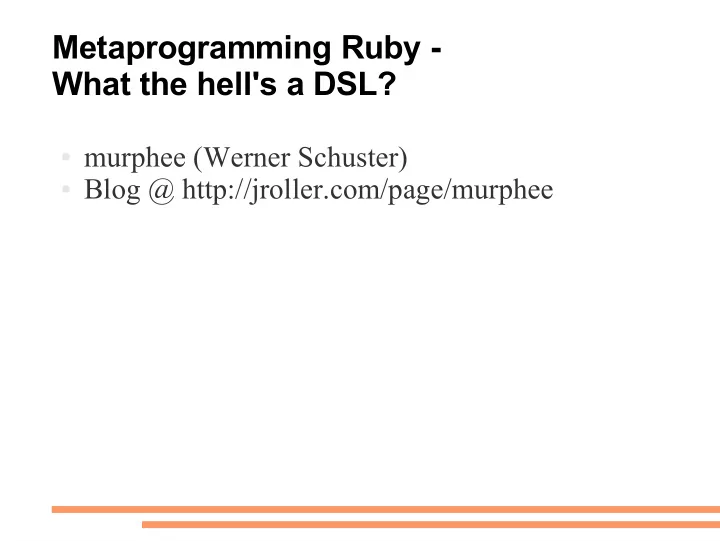

Metaprogramming Ruby - What the hell's a DSL? ● murphee (Werner Schuster) ● Blog @ http://jroller.com/page/murphee
Meta?
Programs that write Programs
Compiler
DSLs
Regexes, anyone?
Always good to start with quotes by...
Alan Kay
The general attitude seems to be that people should wear square shoes, because squares are easier to design and manufacture than foot shaped shoes. ...
If the shoe industry has gone the way of the computer industry it would now be running a $200-a- day course on how to walk, run and jump in square shoes." Alan Kay
DSLs ● Internal – use host language ● External – Yacc, ANTLR, ...
Executable Spec
Let's start with... Dylan ● http://www.networknightvision.com/ ● Dylan ● declarative protocol spec
Ethernet spec in Dylan define protocol ethernet−frame ( header−frame ) summary ”ETH %= −> %=/%s ” , source−address , destination−address , compose ( summary , payload ) ; field destination−address : : <mac−address >; field source−address : : <mac−address >; field type−code : : <2byte−big−endian−unsigned−integer >; var iably−typed−field payload , type−function: select ( frame . type−code ) #x800 => <ipv4−frame >; #x806 => <arp−frame >; otherwise => <raw−frame >; end ; end ;
Ethernet spec in Dylan define protocol ethernet−frame ( header−frame ) summary ”ETH %= −> %=/%s ” , source−address , destination−address , compose ( summary , payload ) ; field destination−address : : <mac−address >; field source−address : : <mac−address >; field type−code : : <2byte−big−endian−unsigned−integer >; var iably−typed−field payload , type−function: select ( frame . type−code ) #x800 => <ipv4−frame >; #x806 => <arp−frame >; otherwise => <raw−frame >; end ; end ;
Ethernet spec in Dylan define protocol ethernet−frame ( header−frame ) summary ”ETH %= −> %=/%s ” , source−address , destination−address , compose ( summary , payload ) ; field destination−address : : <mac−address >; field source−address : : <mac−address >; field type−code : : <2byte−big−endian−unsigned−integer >; var iably−typed−field payload , type−function: select ( frame . type−code ) #x800 => <ipv4−frame >; #x806 => <arp−frame >; otherwise => <raw−frame >; end ; end ;
Design Process
Incremental does it ● Sketching ● Make it work ● ? ● Profit!
Example time http://www.infoq.com/articles/properties-metaprogramming ●
Properties in Ruby/1 ● C#-like Properties in Ruby ● Why? – to piss of Java zealots
Properties in Ruby/2 - Sketching class Foo property name end
Properties in Ruby/2 - Sketching class Foo property name end NameError: undefined local variable or method `name' for main:Object
Properties in Ruby/3 - Fix class Foo property :name end
Properties in Ruby/3 - Fix class Foo property :name end NameError: undefined method `property' for main:Object
Properties in Ruby/3 - Fix def property(sym) ... end class Foo property :name end
Properties in Ruby/3 - Fix def property(sym) define_method("#{sym}=") do |value| instance_variable_set("@#{sym}", value) end end class Foo property :name end
Properties in Ruby/3 - Fix name= def property(sym) define_method("#{sym}=") do |value| instance_variable_set("@#{sym}", value) end end class Foo property :name end
Properties in Ruby/3 - Fix def property(sym) define_method("#{sym}=") do |value| instance_variable_set("@#{sym}", value) end @name end class Foo property :name end
Properties in Ruby/4 - Expand def property(*sym, &bl ) # Code: Homework define_method("#{sym}=") do |value| # More Homework instance_variable_set("@#{sym}", value) end end class Tower property(:width, :height) {|val| val > 200} end
What we know by now ● Class definitions are executed ● Symbols are nice ● Blocks too
Another one
Pattern Matching
Parseweasel
Ruby ParseTree foo.hello(1)
Ruby ParseTree foo.hello(1) -> [:vcall, :hello, :foo, [:args, [:lit, 1] ] ]
Ruby ParseTree foo.hello(1) -> [:vcall, :hello, AST as: :foo, s-expr symbolic expression [:args, [:lit, 1] ] ]
ParseWeasel pattern [:vcall, :name_, :recv_, :args_]
ParseWeasel pattern [:vcall, :name_,:recv_, :args_] someone.something foo.bar murphee.speak
ParseWeasel pattern/2 [:vcall, :hello ,:recv_, :args_]
ParseWeasel pattern/2 [:vcall, :hello ,:recv_, :args_] foo.bar foo.hello huey().lewey().hello() huey().speak
ParseWeasel handlers handler ([:vcall, :hello,:recv_, :args_]) {|s| puts “Found a hello #{s[:recv]}” }
ParseWeasel use case: optimizer replace( [:call, :op_, :*, [:lit, 0] ] ){|s| [:lit, 0] }
ParseWeasel use case: optimizer replace([:call, :op_, :*, [:lit, 0] ]){|s| [:lit, 0] } x = foo * 0
Ruby DSLs ● Keep it simple ● Stick to basics ● If it limps like a hack – it probably is one
Let's push it further
Let's mess up the syntax
Hello LISP ( defun factorial (x) ( if (zerop x) 1 ( * x (factorial (- x 1))) ) ) ( factorial 42)
Macros
C Preprocessor
C Preprocessor
LISP Macro example: Infix (* a 42)
I want my infix!
LISP Macro example: Infix what I write ( infix (a * 42) )
LISP Macro example: Infix (defmacro infix (one op two &rest body) `(,op ,one ,two ) ) what I write (infix (a * 42) )
LISP Macro example: Infix (defmacro infix (one op two &rest body) `(,op ,one ,two ) ) what I write (infix (a * 42) ) what gets executed (* a 42)
LISP Macro: real use cases ● Practical Lisp – MP3 binary parser – executable spec ● Many LISP control structures
Macros in the real world ● Mathematica – D[x ^ 2] – Integrate[x ^ 3] – Expand[ x ^ 42] – ● Macro-like ● “FullForm” ~ s-expr – 3x -> Times[3, x ]
Let's wrap up Practical Lisp ● – http://www.gigamonkeys.com/book/ http://ola-bini.blogspot.com/2006/09/ruby-metaprogramming-techniques.html ● http://www.infoq.com/articles/properties-metaprogramming ●
Recommend
More recommend